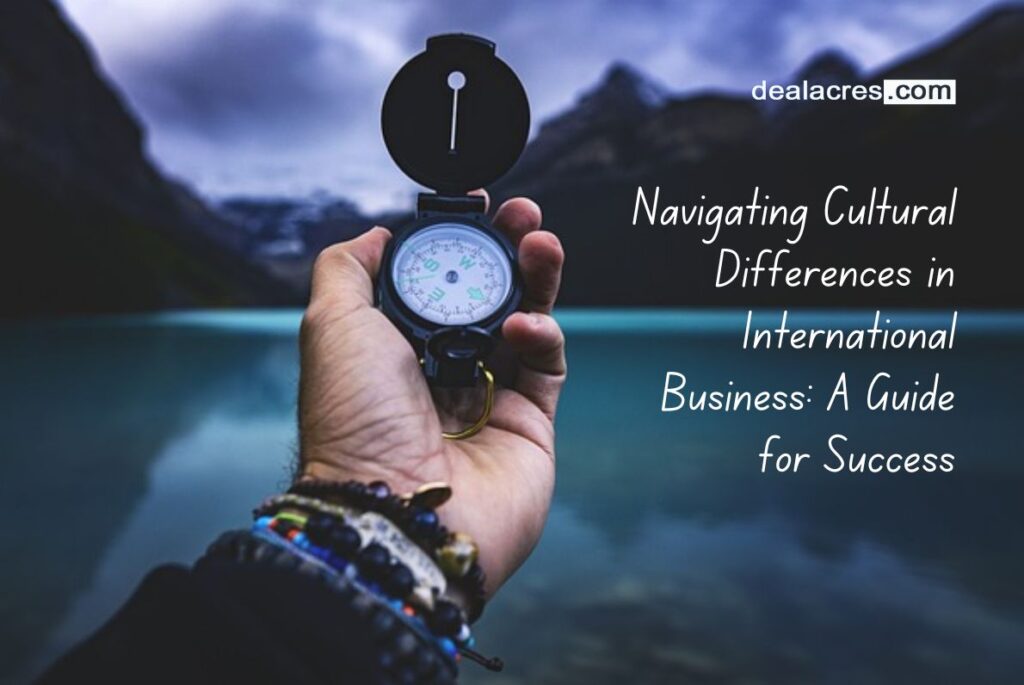In today’s interconnected world, businesses are increasingly expanding their operations across borders. While this presents exciting opportunities for growth and collaboration, it also brings forth the challenge of navigating cultural differences. Understanding and respecting these differences is crucial for success in international business. In this article, we’ll explore the importance of cultural awareness and provide practical tips for effectively managing cultural diversity in the global marketplace.

Why Cultural Awareness Matters in International Business
Cultural awareness is the foundation of successful international business interactions. Culture encompasses a wide range of elements, including language, customs, values, beliefs, and social norms. These factors influence how individuals perceive the world around them and shape their behaviors and communication styles.
The focus keyword here is “cultural awareness,” which is the key to unlocking successful international business endeavors. Without it, misunderstandings, conflicts, and missed opportunities can arise, hindering progress and profitability.
Understanding Cultural Differences
One of the first steps in navigating cultural differences is to recognize and understand them. Every culture has its unique practices and perspectives, and what may be acceptable in one culture could be offensive or inappropriate in another. For example, while a firm handshake is customary in Western cultures as a sign of confidence and trustworthiness, in some Asian cultures, a gentle bow may be more appropriate.
Language barriers can also pose challenges in international business. Even if English is widely used as a lingua franca, nuances in language and communication styles can lead to misunderstandings. It’s essential to be mindful of cultural differences in communication, such as direct versus indirect communication styles or the use of formal versus informal language.

Tips for Navigating Cultural Differences
- Educate Yourself: Take the time to research and learn about the cultural norms, customs, and etiquette of the countries where you plan to do business. This demonstrates respect for your international partners and helps you avoid unintentional faux pas.
- Adapt Your Communication Style: Be flexible in your communication approach and adapt it to suit the cultural preferences of your counterparts. This may involve adjusting your tone, language, and level of formality to ensure clarity and understanding.
- Build Relationships: Cultivate strong relationships built on trust and mutual respect. In many cultures, business is conducted based on personal connections, so investing time in relationship-building can pay dividends in the long run.
- Practice Active Listening: Listen attentively to your international partners and seek to understand their perspectives and concerns. Avoid making assumptions based on your own cultural biases and be open to different ways of thinking and doing business.
- Be Mindful of Nonverbal Cues: Nonverbal communication, such as body language, gestures, and facial expressions, can vary significantly across cultures. Pay attention to these cues and ensure that your body language conveys respect and professionalism.
- Seek Feedback: Don’t be afraid to solicit feedback from your international counterparts about your cultural competence. This demonstrates humility and a willingness to learn and improve.
- Be Patient and Flexible: Cultural adaptation takes time, so be patient and don’t get discouraged by initial setbacks or misunderstandings. Stay flexible and be willing to adjust your approach as needed to accommodate cultural differences.

Case Study: Coca-Cola’s Cultural Adaptation
A notable example of successful cultural adaptation in international business is Coca-Cola’s approach to localization. Despite being a global brand, Coca-Cola recognizes the importance of tailoring its products and marketing strategies to suit local preferences and cultural sensitivities.
For instance, in India, where the majority of the population is Hindu and vegetarianism is common, Coca-Cola offers a range of non-alcoholic beverages that are certified as vegetarian-friendly. In the Middle East, where Islamic dietary laws prohibit the consumption of alcohol, Coca-Cola produces halal-certified products that comply with religious guidelines.
By embracing cultural diversity and adapting its offerings accordingly, Coca-Cola has been able to establish a strong presence in markets around the world and build meaningful connections with consumers from diverse backgrounds.
Conclusion
In conclusion, cultural awareness is essential for success in international business. By understanding and respecting cultural differences, businesses can avoid misunderstandings, foster trust and collaboration, and capitalize on opportunities in the global marketplace. By following the tips outlined in this article and learning from examples like Coca-Cola’s cultural adaptation, businesses can navigate cultural differences effectively and thrive in today’s interconnected world. Remember, cultural awareness is not just a nicety—it’s a necessity for sustainable international business growth.




